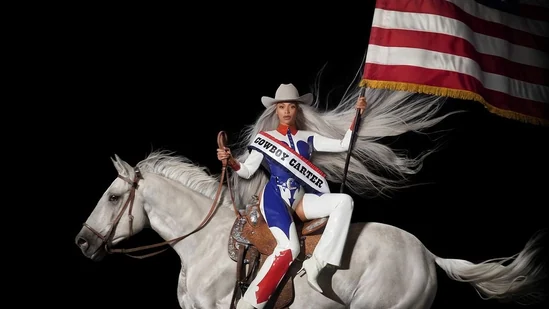Beyoncé’s latest album, Cowboy Carter, made its debut on streaming platforms and in stores on March 29, showcasing once again why she’s a force to be reckoned with after over 25 years in the industry.
 True to her style, the album’s blend of genres is masterfully executed, drawing on elements of country music that are carefully researched and woven into the project.
True to her style, the album’s blend of genres is masterfully executed, drawing on elements of country music that are carefully researched and woven into the project.
The eagerly awaited Act II of Beyoncé’s three-part project, which began with Renaissance in 2022, has arrived.
Cowboy Carter boasts 27 tracks that span a diverse range of genres including blues, country, R&B, and folk.
In an Instagram post revealing the cover art and title of the album, Beyoncé provided insight into the inspiration behind the project. She shared that the album had been in the works for over 5 years and was born from an experience where she didn’t feel embraced.
Many fans speculate that she’s referring to her performance of “Daddy Lessons” at the 2016 Country Music Association Awards with The Chicks.
After months of anticipation, Cowboy Carter has finally arrived. While it does have country influences, it’s also a multifaceted work with diverse influences and references, all while remaining quintessentially Beyoncé.
Songs unleast a Western Saga
Cowboy Carter, akin to Beyoncé’s prior album act i: RENAISSANCE, continues a legacy of honoring underrepresented narratives.
With each of its 27 tracks, the album presents a reimagined interpretation of Western films, drawing inspiration from cinematic classics such as “Five Fingers For Marseilles,” “Urban Cowboy,” “The Hateful Eight,” “Space Cowboys,” “The Harder They Fall,” and “Killers of the Flower Moon.”
Every track within Cowboy Carter unfolds like a cinematic journey, offering panoramic views of landscapes, intricate character portrayals, and compelling conflicts reminiscent of the Chitlin’ Circuit or spaghetti Western cinema.
Beyoncé embodies the cowboy archetype, symbolizing the essence of the American West and South. She celebrates the rodeo as a communal space where enthusiasts of country music and culture find camaraderie and belonging.
Embedded within the album are Beyoncé’s personal experiences, intertwined with a deep reverence for Black history.
Beyoncé sings Italian opera
In “Daughter,” Beyoncé presents herself as reminiscent of her father, with intense lyrics warning of her formidable nature.
Following her rendition of Dolly Parton’s “Jolene,” which transforms desperation into a menacing warning, Beyoncé incorporates a portion of the 18th-century Italian aria “Caro Mio Ben” into the song.
The Italian lyrics loosely translate to “My dear beloved / At least believe me / Without you my heart languishes,” adding depth and emotion to her storytelling.
“Blackbird”: A song to empower
The second track on Cowboy Carter is a surprising cover of The Beatles’ 1968 song, “Blackbird,” featuring Tanner Adell, Brittney Spencer, Tiera Kennedy, and Reyna Roberts. Despite seeming out of place on a country-inspired album, there’s a deeper connection to Beyoncé’s projects honoring Black history and art.
“Blackbird,” written by Paul McCartney and John Lennon, was inspired by the Civil Rights Movement in the 1960s, influenced by the racial tensions in the US at the time.
He described “Blackbird” as a message of encouragement to Black women facing challenges in the US, conveying a message of hope and perseverance. This cover on Cowboy Carter ties into Beyoncé’s theme of empowerment.
Beyoncé recorded 100 songs for Cowboy Carter?
The musician revealed that she recorded nearly 100 songs while crafting the album.
Beyoncé explained her approach, stating, “My process is that I typically have to experiment.
I enjoy being open to have the freedom to get all aspects of things I love out, and so I worked on many songs.”
She elaborated further, saying, “I recorded probably 100 songs. Once that is done, I am able to put the puzzle together and realize the consistencies and the common themes, and then create a solid body of work.”
Jumbled release order
A Medley of Mixed Melodies
Cowboy Carter boasts a plethora of unmistakably country sounds. String instruments serve as the album’s sonic backbone, with the slide guitar on tracks like “DESERT EAGLE” and “TEXAS HOLD ‘EM” blending seamlessly with Beyoncé’s delicate vocals.
The lively accordion melodies on “RIIVERDANCE” pay homage to zydeco music and Beyoncé’s Creole heritage, while “PROTECTOR,” featuring Beyoncé’s youngest daughter Rumi, is driven by acoustic guitar. In “SWEET HONEY BUCKIN,” the classic “I Fall to Pieces” by Patsy Cline is cleverly woven into the arrangement.
Martell and Parton’s Special Appearance
The album also features appearances from country and Americana icons. Dolly Parton and Linda Martell, both trailblazers in country music, make significant contributions to the album’s narrative. Parton offers advice before “TYRANT,” while Martell’s voice sets the stage for the experimental track “SPAGHETTII.”
 Linda Martell’s presence on the album highlights the complex history of Black artists in country music, underscoring the importance of acknowledging their contributions.
Linda Martell’s presence on the album highlights the complex history of Black artists in country music, underscoring the importance of acknowledging their contributions.
Martell herself expressed pride in Beyoncé’s exploration of her country roots, emphasizing the beauty and honor in being part of the project.
Dolly Parton’s influence extends beyond just musical inspiration on Cowboy Carter, as evidenced by Beyoncé’s use of her nails as instruments.
In “Riverdance,” a steady rhythm can be heard in the background, created by Beyoncé’s nails. The album features handclaps, horseshoe steps, boot stomps on hardwood floors, and yes, Beyoncé’s nails as percussion.
The idea of using nails as instruments seems to pay homage to Dolly Parton, who famously demonstrated this technique in a 1987 interview.












